NO ONE SPEAKS of À la recherche du temps perdu (In Search of Lost Time) as a gay novel; it’s a novel about fin-de-siècle Paris, about the rarefied world of duchesses and princesses. It’s the story of a man who dips a madeleine (a sort of French cookie) into his tea and is instantly transported, via involuntary memory, back to his childhood. It’s the saga of Swann, a Parisian æsthete 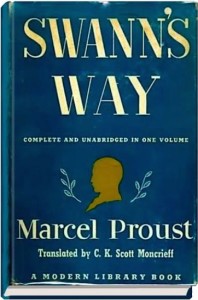 obsessed with Odette, a cocotte who, he marvels at the end, was “not even my type,” a novel about love, jealousy, and snobbery. True. But it’s also about homosexuality, so much so that Proust was worried as he was trying to get it published that someone else would beat him to the punch—because he knew he was writing about a world no one else had described before.
obsessed with Odette, a cocotte who, he marvels at the end, was “not even my type,” a novel about love, jealousy, and snobbery. True. But it’s also about homosexuality, so much so that Proust was worried as he was trying to get it published that someone else would beat him to the punch—because he knew he was writing about a world no one else had described before.
But what about the Satyricon—Petronius Arbiter’s much earlier novel about a young man pursuing his boyfriend through ancient Rome? Isn’t that the world’s first gay novel? Maybe. But in the Satyricon, same-sex desire is not the subject; it is not even abnormal. In Proust’s time, homosexuals were social outcasts, men who lived, in Proust’s metaphor, with a secret vice so isolating they might as well be living on Mont Blanc. Reading Proust, the modern homosexual recognizes everything about this underground world of cab drivers, footmen, aristocrats, and bellhops, never before or better described than in Proust’s novel, so brilliantly that if it’s not the first gay novel, it is still arguably the most profound.
What follows is excerpted from the September-October 2006 issue.
— AH
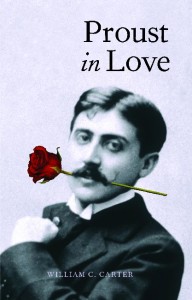 Proust in Love
Proust in Love
by William Carter
Yale University Press. 252 pages, $26.
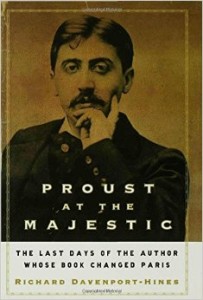 Proust at the Majestic: The Last Days of the Author Whose Book Changed Paris
Proust at the Majestic: The Last Days of the Author Whose Book Changed Paris
by Richard Davenport-Hines
Bloomsbury. 358 pages, $24.95
WILLIAM CARTER begins his 2006 biography Proust In Love with a schoolboy trying to persuade, via letters written in geography class, his classmates to have sex with him. The classmates all refuse. “There was something about him we found unpleasant,” one of them said about Proust years later. “His kindnesses, his tender attentions, his caresses … we often labeled as mannerisms, poses, and we took occasion to tell him so to his face. … We were rough with him. The poor wretch!” Poor wretch, who never stopped trying. “What number did you give him,” asked Proust’s philosophy teacher, on seeing Marcel with yet another new friend, “when he passed through the door of your heart?”
Gide accused Proust of portraying only grotesque homosexuals in his novel, and of not only gender-changing his characters but of giving the charming features to the heterosexuals. Proust conceded the point. Of course, no one in the entire novel, hetero- or homosexual, manages to find much happiness in the attempt to possess another human being; but Proust knew his portraits would anger some homosexuals. He also felt he was risking his career by writing about homosexuality at all. But he went ahead with it—because the subject was not only new but central to his book, and life.
No one is more brilliant on this topic than the Narrator of Proust’s novel—though he views the “accursed race” in a way that our more therapeutic culture might find, well, a bit dire. Proust subscribed to the scientific view of his time that inverts were women trapped in men’s bodies, and lesbians the reverse (though he told Gide that he knew the man-woman was only one kind of homosexual). The Narrator also points out that homosexuals are trapped by a paradox: they are attracted to men who are virile, but such men can have no interest in sleeping with them for any reason other than cash. He describes homosexuals who remain outcasts from society to the day they die, even though they constitute a widespread subculture made up of people from every social class. Indeed, Proust’s great homosexual character is an aristocrat who has a taste for footmen and cab drivers. Jorge Luis Borges claimed Charlus was the only real character Proust created, and if truth be told, the book is most alive when he is on the page. That may be because through him Proust was discharging the anguish and hilarity of his own predicament.
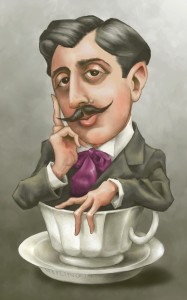 In Proust In Love, we soon learn that Proust’s attempt to persuade his favored classmates to have sex with him using brilliant arguments summoned from ancient Greece was just the start. Although Carter mentions Proust’s androgyny and childhood crushes on female playmates, and Davenport-Hines claims Proust slept with the mistress of one of his friends (in a sort of erotic triangulation), Proust’s father worried so much about his son that he sent the young Marcel to a prostitute—a customary initiation for sons of the French bourgeoisie around age sixteen. During Proust’s visit, however, he seems to have experienced a sort of homosexual panic, and all he did was break a chamber pot.
In Proust In Love, we soon learn that Proust’s attempt to persuade his favored classmates to have sex with him using brilliant arguments summoned from ancient Greece was just the start. Although Carter mentions Proust’s androgyny and childhood crushes on female playmates, and Davenport-Hines claims Proust slept with the mistress of one of his friends (in a sort of erotic triangulation), Proust’s father worried so much about his son that he sent the young Marcel to a prostitute—a customary initiation for sons of the French bourgeoisie around age sixteen. During Proust’s visit, however, he seems to have experienced a sort of homosexual panic, and all he did was break a chamber pot.
It was not till he was a young man out in society that Proust acquired a lover in the form of a man his own age: the Venezuelan composer Reynaldo Hahn. But he ruined this relationship by his demands for total devotion, and then fell himself for the young Lucien Daudet. This did not last long. When Proust’s first book, Pleasures and Days, came out, a homosexual journalist named Jean Lorrain implied that Proust and Daudet were lovers, and even though this was no longer the case, Proust still fought a duel with Lorrain to deny the charge. In short, being homosexual was something Proust always denied his entire life.
But that’s what he was, and in Proust in Love we follow a string of crushes from schoolmates to society figures like Bertrand de Fénelon, an aristocrat whose bisexuality Proust did not learn of, alas, until after Fénelon was killed in World War I. The great passion of Proust’s life, however, was a chauffeur he hired after his parents died: Alfred Agostinelli, a confirmed heterosexual who, Proust said, “with my mother, my father, is the person I loved most.” (“I really loved Alfred,” he wrote to Reynaldo after Agostinelli’s death in an airplane accident. “It isn’t enough to say I loved him, I adored him. And I don’t know why I write that in the past tense, for I love him still.”) Eventually, Proust turned to waiters at the Ritz, including Henri Rochat, who moved in with Proust but so bored him (and his housekeeper Céleste) that Proust spent two years trying to get him a job. When one finally came through, it was in a bank in Buenos Aires. Then there were the bellhops: Henri Bardac, a friend of Proust’s, said the novelist would be washing his hands when the bellhop was summoned to his room, whereupon Proust would say, “My friend, I have a tip for you, but I can’t give it to you because my hands are wet; please get it out of my pants pocket.”
Finally, there was the male brothel that Proust helped furnish with pieces he’d inherited from his parents. In the novel, Charlus goes there during a World War I blackout to be whipped by a young butcher boy. Proust’s own tastes were somewhat different. According to the testimony of an employee, Proust would first gaze through a glass pane into a room of young men playing cards, make his selection, and then go upstairs to a room. “A quarter of an hour later, I knocked on the door, went in, and found Marcel already in bed with the sheet drawn up to his chin. He smiled at me. My instructions were to take off all my clothes and remain standing by the closed door while I satisfied myself under the anxious gaze of Marcel, who was doing the same. If he reached the desired conclusion, I left after having smiled at him and without having seen anything other than his face and without having touched him.” If Proust did not climax, “he would make a gesture for me to leave and Albert would bring two cages,” each one with a starving rat, and as the two rodents fought each other to the death, Proust would finally achieve release.
The rat story has been part of Proust’s legend for years, although—in the recent biography by Jean-Yves Tadié, and here, in Proust in Love—there is no proof that it’s true. While there is evidence that Proust was caught at the brothel in a police raid, Proust’s housekeeper Céleste denied the rat story. (“Richard Gere and the gerbils!” said the friend to whom I told the tale, which made me think, Maybe that’s all it is. People who wish to believe strange things about celebrities for some reason turn to rodents.) Nowadays, it’s no longer shocking—not nearly so shocking, say, as learning that Albert Nahmias, one of Proust’s friends, killed a child while racing in his motorcar to keep an appointment with Proust, because he knew how upset Proust got when someone did not show up.
Cocteau, however, favored the rat story—and added a photograph of Proust’s mother, which had to be profaned before orgasm was achieved. Profanation of the mother, Cocteau felt, was key to Proust. In Swann’s Way, the composer Vinteuil’s daughter makes her female lover spit on a photograph of her doting father before they make love. In real life, if we are to believe Maurice Sachs, a dubious protégé of Cocteau, Proust had the boys at the brothel spit on photographs of society women whose salons Proust frequented while yelling, “Who’s that whore?” Well, we’re all conflicted.
Carter argues that In Search of Lost Time is really a love letter to Madame Proust. There is certainly plenty of evidence for this in the novel. Some of the most tender, most moving moments in it deal with the decline and death of the grandmother (the novel’s stand-in for Proust’s mother). The moment when the Narrator hears his grandmother speak on the telephone and realizes suddenly how sick and weak she has become is infinitely more touching than any of the cerebral observations about losing Albertine, the woman with whom the Narrator becomes obsessed (a woman, said Cocteau, who was obviously a man). The passages dealing with the Narrator’s remorse over having been unkind to his grandmother so cut to the heart that a gay reader might suspect that In Search of Lost Time is an apology to his mother for being homosexual. That she was dead seemed to be the chief fact of his life by the time he wrote his novel. “If I were sure to meet my mother again,” Proust told Céleste, “in the Valley of Jehosaphat or anywhere else, I would want to die at once.”
Indeed, in the novel, maternal love seems to be the only valid kind. Love between adults is ruined by jealousy, possessiveness, and the impossibility of “the act of physical possession (in which, paradoxically, the possessor possesses nothing).” The trouble for Proust was that in life he was not only the detached artist producing brilliant aphorisms, he was also the possessive, obsessive, jealous lover. It was his own failures that enabled him to describe Swann searching for Odette, the Narrator spying on Albertine, Charlus going to the brothel. When the incredibly intelligent Proust pursued someone, he acted in the stupidest possible way, alienating Hahn with his demands for intimacy, hiring a detective to spy on Agostinelli, admitting that his passion for someone never lasted more than a year and a half. With Proust, we seem to have a case of someone so hungry for Love that he drove people off. Lucien Daudet told Cocteau that Proust was “a gigantic insect.” Proust accused himself of an “incapacity for happiness.” The great love of Proust’s life, Agostinelli, was a straight man from the working class whose family, when Proust sent flowers to the funeral, was disappointed that they were not plastic.
“Looking back over his love life,” writes Carter, “it seems fair to say that Proust never had a sexually fulfilling relationship with a companion whom he loved. If he did, one finds no definite trace of such affection in his letters and writings. It seems unlikely that he could have found a partner capable of satisfying his great longings or with sufficient patience to endure his endless and unreasonable demands. In the end, he became disillusioned about erotic love.” Reading Carter’s book, one has to wonder: who could have met Proust’s needs for exclusive submission, when anyone who did agree to that (Henri Rochat, for instance) bored him silly? There seems to be a contradiction here. But contradiction is the essence of Proust’s view.
One of Proust’s ideas that Carter relies on in his book is the theory of multiple selves. We change so constantly, Proust felt, that when a dear friend announced he was being assigned to a diplomatic post in Istanbul, Proust wrote that he was not sad, because the self that loved this friend was already ceasing to exist. (A nice theory, one suspects, but no help for Proust’s sense of abandonment.) Even when someone we love dies, Proust wrote, it’s not their cessation but our own that brings oblivion. “It is not because other people are dead that our affection for them fades; it is because we ourselves are dying. … My new self, while it grew up in the shadow of the old, had often heard the other speak of Albertine; through that other self, through the stories it gathered from it, it thought that it knew her, it found her lovable, it loved her; but it was only a love at second hand.”
This mercurial quality of human nature nearly induced Proust to call his novel by a title that now belongs to just one section: “The Intermittences of the Heart.” The last chapter of Carter’s book takes as its epigraph this quote from Proust: “Only love is divine.” But a more famous sentence of Proust’s compares falling in love to succumbing to a bacillus. Love in Swann’s Way is a disease triggered by the germ called Jealousy. It comes into being only when we lose someone. When we have the person, we don’t want them. (Proust felt this about longing in general: Life grants us everything we want, he said, on one condition—that we no longer desire it.) We are, in other words, hopelessly fickle. But so is the universe: How, in a world in which everything is constantly changing, including our selves, can anything last, including Love?
In Proust at the Majestic (2006), by Richard Davenport-Hines, we are reminded, for starters, that Proust did not die before he could savor his greatness; he fully enjoyed the considerable success that the first volumes of his book brought. If sales were not huge (Proust said he wanted “to reach a wider audience, the sort of people who buy a badly printed book before getting into a train”), the people who read him made up in quality for what they lacked in quantity. It was the elite of London and Paris and New York, as exemplified by Violet and Sidney Schiff, who became obsessed. Given this success, Davenport-Hines says it took courage to publish Sodom and Gomorrah. Indeed, some people (both homo- and heterosexual) were offended—but even Sidney Schiff, the rich amateur who saw himself in the character of Charles Swann, admitted that Charlus, not Swann, was Proust’s greatest creation. While In Search of Lost Time is never called a “gay novel,” the subject of homosexuality is central to it; and in Davenport-Hines’ view, the nerve it took to write about inversion was the same courage Proust showed in fighting his duel with Jean Lorrain to deny the imputation that Proust and Daudet were lovers.
We imagine we are beyond all that now, but read the great essay on the “accursed race” in the opening pages of Sodom and Gomorrah—read any scene in which Charlus appears—and see if it doesn’t still ring uncannily true. Proust’s brilliance was such that when he died people could scarcely believe this consciousness could be extinguished. Davenport-Hines describes the funeral that wound through a shocked Paris so solemnly and slowly that Cocteau and Raymond Radiguet had time to slip away to eat pancakes at Le Boeuf sûr le Toit before rejoining the hearse at the cemetery. Reading about people’s reaction to Proust’s demise, one has a weird feeling that we’re witnessing the founding of some new religion: the religion of art. (Ravel’s Pavane for a Dead Infanta was played at the funeral—not liturgical music—at Proust’s request, and Catholic critics lamented the absence of God in his novel.) We read the story of his death as if following some sort of Passion. Partly this has to do with the times: our culture’s unappeasable appetite for gossip, the Back Story. Partly it has to do with Proust’s era, so vanished, and his personality, so rich in paradox.
Proust wrote the most brilliant observations about homosexuality ever, while challenging every imputation that he was homosexual himself; he claimed love was merely a disease, and the beloved merely a delusion—a creation of our own egos—while obviously loving certain people passionately; he heaped nothing but contempt on the idea of friendship, while saying of his first lover and lifelong confidante Reynaldo Hahn: “he’s the dearest friend to me, the best, a brother. If he murdered someone I’d hide the corpse in my bedroom so that people thought that I had done the deed.” Proust wrote a book that is filled with the most mordant and hilarious depictions of human selfishness, and yet, as Carter points out, its final effect is one of joy. As for the rest—the sifting through everything we know about the author—when someone asked Proust, “For what fault have you the greatest toleration?” he responded: “For the private life of geniuses.”
Andrew Holleran, author of many novels starting with Dancer from the Dance (1978), has been a regular GLR contributor since Issue I.1.


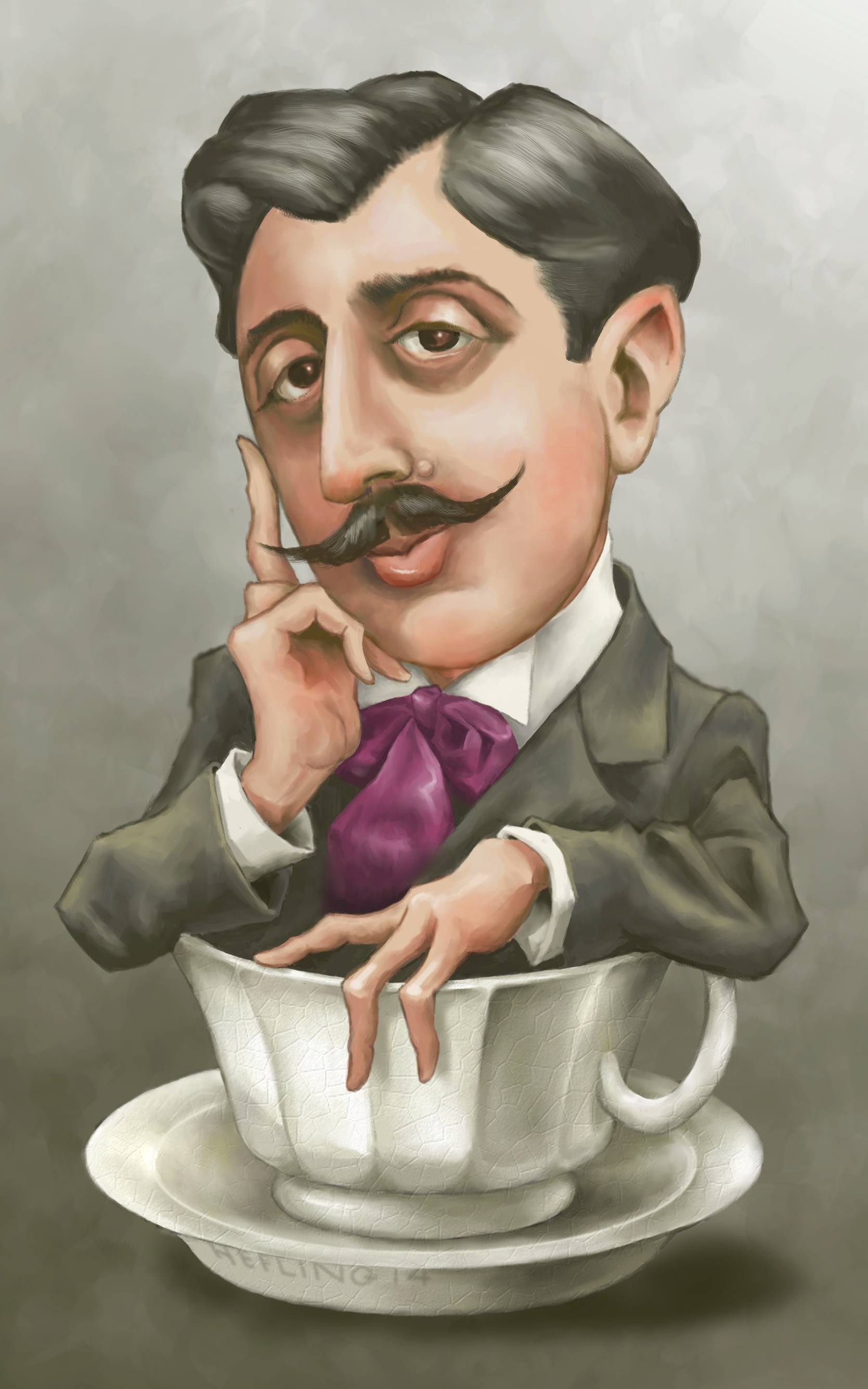




Discussion1 Comment
Hello,
Having read Swanns Way I was under the impression that Swann was seen as a modest sexual object by several members of the aristocracy, who he attributes himself to as being their apprentice. It seems his real internal isolation comes from the fact that he is never able to express his wishes to Odette in a manner that can lead to love. While she is succesful in leaving him for being too predictable, and with no spontaneity. Swann himself is seen as the crucible who has an amicable influence on those who find him to be trustworthy. It is unfortunate for Swann that the lack passion and zeal in his being a footstool to the gentry causes him to run off again and again in hopes of hearing some word from Odette that might invite him back into her captivity, and which will allow him to reconcile with his being rejected. However, his intention to show that he has gained confidence reveals a shallow object who is unable even to stimulate a thought that might lead to an emotional response.